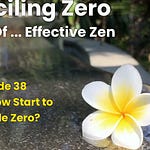Video Posts on YouTube:
https://www.youtube.com/@ZenOptimism/videos
Last Few Substack Posts:
Terms In The Audio:
Zero: The fundamental teaching of the late Zen master Joshu Sasaki: “As the Buddha taught, zero inevitably splits into mutually opposing activities which inevitably disappear into zero.”
Reconciling Zero: The investigation of Zero in the pursuit of Effective Zen.
Effective Zen: The one path on Zen Mountain that gives any one individual the best chance of reaching the peak (realizing non-duality).
Zen Mountain: The collection of all possible Zen paths.
Buddhism: The set of spiritual activities where the highest good is the realization of non-duality.
Highest Good: That which exists for its own sake (there is nothing greater).
The Realization of Non-Duality: The complete understanding of a self inseparable from circumstance – where complete understanding implies manifestation.
The Realization of Infinite Mind: Same as the Realization of Non-Duality
Zero-Buddhism:
The preconditions necessary for Buddhism to arise, namely:
An enlightened teacher.
A clear picture of a path.
An understanding of the obstacles expected along this path.
The Effective Teacher
The effective teacher recognizes that, at some level, all of us seek perfect certainty, which ultimately manifests as the realization of infinite mind, and which is invariably obstructed by a misreading of the self.
The Five Aggregates
Form – which refers to the physical aspect of our being, and especially important for this discussion are our sense organs (eyes, ears, etc.)
Consciousness – which refers to our ability to sense (see, hear, smell, taste, touch, and think)
Perception – which refers to our cognitive abilities, which rely, of course, on consciousness
Feeling – which refers to how we react to what we perceive (positively, negatively, or neutrally)
Volition –which, based on feeling, refers to our ability to choose and act.
And so, we can see the five aggregates as a hierarchy of human endeavor that begins with form and results in choice and action.
Read the Anattalakhana Sutta here.
Summarizing the Self
Buddhism does not teach the unreality of the self.
Buddhism does teach that, besides the self, there is a phenomenon called the not-self.
The self inevitably arises and disappears. Not a good thing or bad thing – it just is.
One should be constantly on the lookout for self-talk centered around the five aggregates – form, consciousness, perception, feelings, and choosing – as this self-talk invariably obstructs the natural cycling between self and not-self.
The Question For Next Week: Can We Now Start to Reconcile Zero?













Share this post